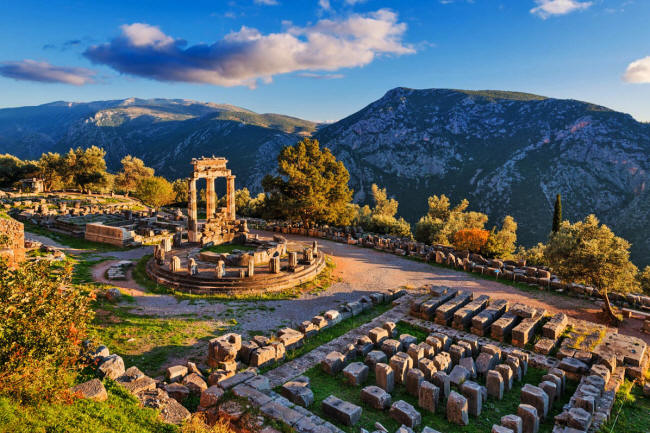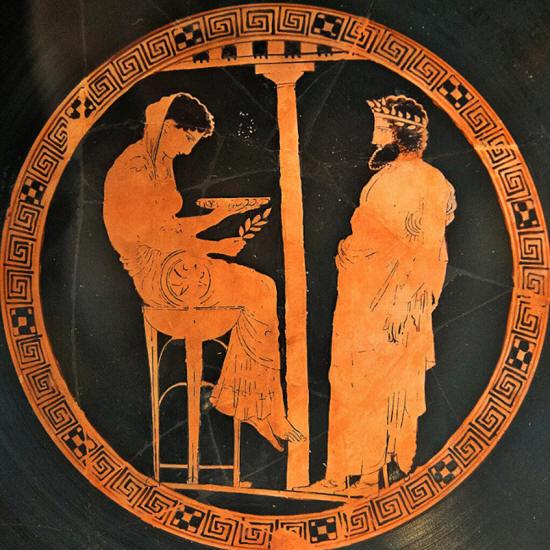|
For many years, he wandered in search of a place fit for his oracles. Under the guidance of a nymph, he made his way to the slopes of Mount Parnassus to build his glorious temple.
The only thing he need do was slay the enormous she-dragon, the serpent Python. Upon his success, he built his towering complex and declared that mankind may forever offer their riches in exchange for his faithful advice.
Apollo then transformed into a dolphin, bringing
sailors from Crete to his shores and making them his priests.
Flourishing for over a millennium, Delphi was rich in both wealth and adoration. Still, much remained hidden beneath the chasms of Mount Parnassus, aside from prophetic fumes.
Ancient words were powerful, and Delphi was the epitome of oracular influence.
But power, no matter how benevolent its
beginnings, eventually and inevitably sows the seeds of corruption.
It was said that Python, which Apollo slew, was there to protect the priestesses and their oracles.
Additionally, the fumes so popularly referenced that produced a psychotropic effect on the oracles can be tied back to this enigmatic priestess cult, given that it was a gift from the earth, Gaia.
The Greek historian Diodorus Siculus claimed that when Apollo's Delphi was established, the Delphians coincidentally stumbled upon this mystifying chasm emitting vapors that led to delusional ecstasy and visions.
Suddenly, people began diving into the chasm, never to be seen again...
So, as a precaution, it was decided that only one
be chosen to breathe these holy vapors. Red-figure kylix depicting King Aigeus with the Pythia.
(Zde / CC BY-SA
4.0)
Only the chosen oracle was allowed to enter, with her priestly attendant and interpreter nearby.
Initially, the oracle would consult only once a year, on the birthday of Apollo, but as popularity grew and prominent members of society flocked seeking advice, the temple began offering her services on the seventh day after the new moon.
The winter months were dedicated to Dionysus, the only time of the year the oracle did not work.
Moreover, the influx of patrons required more
oracles, and so two more were selected, one left in reserve for the
others. This ensured that things ran smoothly at the temple, and no
one oracle was overworked.
On the day of the intended prophecy, a sacrificial animal, usually a goat, would be brought to the steps of the temple for a reading of omens. The response of the goat, upon drink, poured on its head, determined if the day was right for oracular counsel.
If so, the inquirer would make his offerings of sacrifice, gifts, and sacred cake that he was to purchase at the temple.
Before the Pythia met with her waiting guest, she
was to chew leaves from Apollo's sacred laurel tree and quench her
thirst from the Cassotis Spring, which connected to aqueducts
beneath the temple.
It was more common, however, for her to be presented with questions through the priests who then led her to the adytum, while the guest waited at an adjacent location within the temple.
She worked alone, on her tripod, inhaling vapors after consuming substances that would enhance the psychotropic experience.
Whether it be mania, divine madness, or a frenzy of ecstasy, the Pythia always had a message to share. Whether or not she was coherent is subject to debate; the difference in clarity depended on the oracle.
One was known to sing her prophecies, while others gave vague, cryptic messages, and some barely comprehendible.
Whatever the case, the priests were in charge of
deciphering it and recording it in prose or hexameters, of formal
and eloquent style, to the inquirer.
Before Apollo's conquest of the site, there were no male priests.
Their purpose surely must have been more than translating Pythias.
Yet, again,
The answer may be found in the subsequent events following the establishment of Delphi.
A group of male overseers appropriately ran the site, known as the Amphictyonic League. Their twelve members were appointees from the surrounding areas.
Each state had two appointed representatives from
noble houses. They met twice annually as administrators of the
temple's affairs, shrines, treasury, and the Pythian Games.
They had ever increased political influence as Delphi's reputation expanded. Groups that threatened their sanctuary and its land or any of the member cities were subject to war.
During the first of several sacred wars, the league liberated Delphi from pillagers intent on attacking pilgrims, asserting their place as protector and administrator. In celebration, the first Pythian Games commenced, to be held every four years.
Modern scholars often compare them to the current United Nations, as they created international laws, involving them in social affairs and political relations.
To that end, they served Delphi well; they kept the sanctuary safe from attack and made sure it remained an organized enterprise.
Still, as later dates would prove, the
perpetuation of control in Delphi reflects shifting loyalties to
powerful city-states rather than the sanctuary itself.
|



